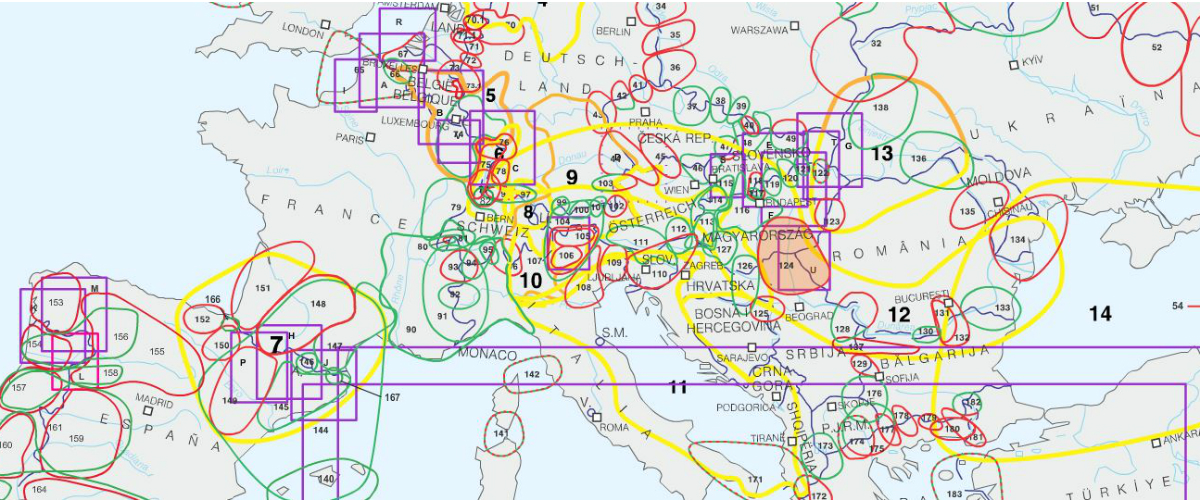The role of Cross-Border Cooperation

The cooperation between the European Union and Latin America for the development of regional integration processes
The participation of the local and regional administrations in European matters and especially, in Cohesion and Regional Politics, has been drawing attention for a while of other integration processes in Latin America or Africa. ORU-FOGAR is organizing a seminar, on 25 September 2015 in Montevideo, entitled “The subnational governments in the framework of Regional Integration Processes”, dealing with an increasingly relevant aspect in the integration processes.
Among other matters in which subnational participation is crucial, this seminar will address border integration. In fact, Border Cooperation understood as the cooperation between neighbour public administrations- although there is also cooperation between private entities, Third Sector, universities, etc.- is constantly growing across national borders, not only in the EU. These initiatives have evolved almost in every European border, progressively supported by the different political decision levels, from the local to the community level. Nevertheless, the coherent implementation in Europe as much as in other continents also means facing issues related to national sovereignty, the nation-state concept and the main role of boarders, besides other aspects related to security, migration or illicit activities.
After some exceptional exchanges since 2000, the Association of European Border Regions, (AEBR) has carried out a deep analysis of the situation and perspectives of the Cross-Border Cooperation in Latin America between 2010 and 2015, thanks to the support from the European Commission (DG Region) and the European Parliament. With the intention of promoting the European experience in regional politics as a source of inspiration in other processes, we have focused on the participation, training and empowering of the local and regional authorities (ALR), its institutional strengthening and, as a result, its decentralization processes. In our first work, Cross-border Cooperation in Latin America. Contribution to the regional integration process (2010), we studied the Border Cooperation in Latin America but focusing especially in very dynamic experiences in the South American subcontinent of which we selected the Triple Border between Brazil, Argentina and Paraguay, and the Brazilian-Uruguayan border to develop SWOT analysis. As a result, we defined a series of concrete projects, an action plan and a roadmap in order to strengthen Border Cooperation in the selected border areas. A recommendations section for other Latin-American borders was also included, with the intention of initiating a more or less systematic dialogue between the different Latin-American and European actors.
From this study onwards, an exchange of experiences based on four informative sessions in Europe and several workshops in Latin America was organised in 2012-2013. Fifty Latin American experts and politicians participated in the European sessions, engaging more than 500 people in all border and Cross-Border regions, projects and other European initiatives taking place. The main goal was to meet the border areas’ first request: specific training in Cross-Border Cooperation. The integration and border development initiatives in Latin America are very rich and diverse and require specific and systematic approaches, preferably in the framework of multilateral integration processes- the Andean Community, Mercosur or the Central American Integration System. This allows Cross-border concepts to emerge between partner countries, subsequently develop joint strategies and programs, and finally organize a permanent cooperation with sustainable structures. The fieldwork study focused on several additional border regions in South America and on the organisation of eleven workshops. Moreover, local actors organised various complementary formative actions, mobilizing around a thousand people in Peru, Brazil, Chile, Argentina, Colombia, Ecuador and Uruguay; to which we must add many meetings and exchanges between different European and Latin American actors in the “ secondary and collateral effects” of these activities.
The information obtained, processed and discussed in the different activities, allowed to draw valuable conclusions and recommendations, enabling to carrying on the dialogue with many local actors and the responsible administrations. Quite a few regions with trans-border dynamics in South America were studied, producing around twenty fact sheets. Meanwhile, a growing number of projects has been developed in some of these borders with the European cooperation and that of other international agencies. The learning process has been constant in both directions due to the number and the quality of these initiatives.
The volume of experiences and lessons learned and the roadmap are in constant evolution, although some recommendations of a general nature persist, such as the need of deepening training or further developing policies to increase decentralization. Although the origin of a successful Cross-border Cooperation still lays on the generation of the necessary confidence through the border. The joint participation and design of the joint training programs may lay the basis of a more effective planning, program design and execution of projects.
Europe has shown the best information available on the tools, practical experience and outcomes of Cross-Border Cooperation in the last decades, and its influence in the European integration. Cross-border development is a complex process that requires a long-term approach (and support). It also seems to be the case in other continents, considering that border dynamics, in general, suffer similar challenges. Structural Funds have been essential in Europe. For that reason, an emphasis on the need of implementing programs inspired in Interreg in Latin America has been placed, as they would allow strengthening the promising existing initiatives, for instance, MERCOSUR Structural Convergence Fund and extend them to other processes. Moreover, other continents are also developing comparable initiatives, such as the African Union Border Programme, and other actions in the Middle East, particularly in the city of Jerusalem. The Cross-border Cooperation can be a decisive tool for the consolidation of integration processes through the borders.
Martín Guillermo Ramírez
Secretary General of the Association of European Border Regions








































































